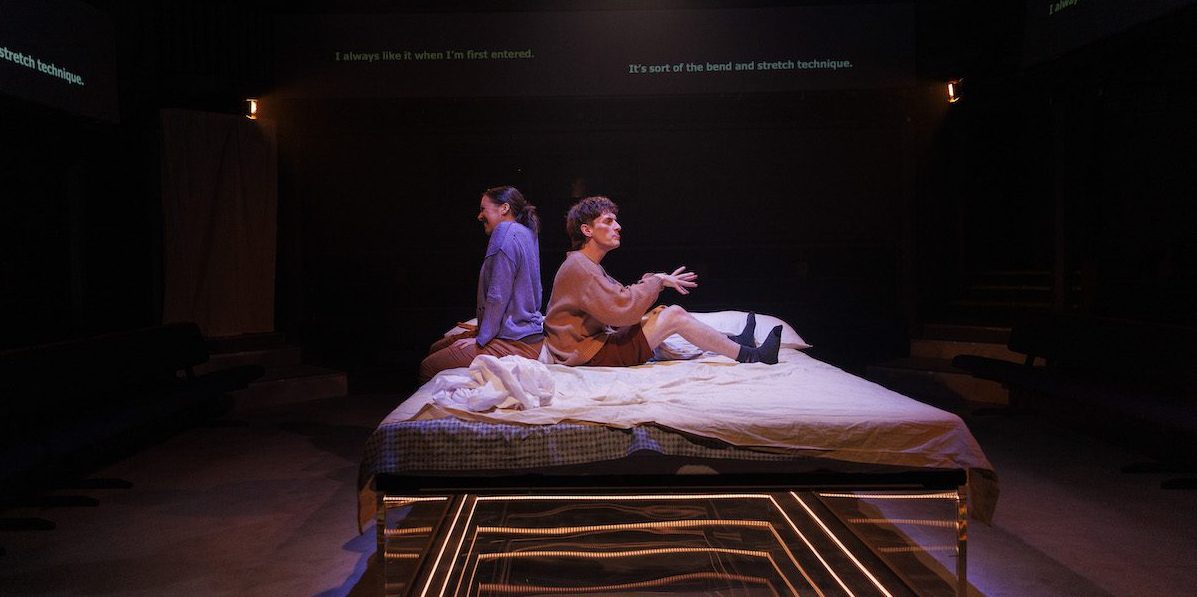Jack Thorne’s play originated at the Edinburgh Fringe before touring widely in 2017. But for most likely audience members this will be a new play. It deserves the warmest of welcomes as a striking drama that takes difficult and dark themes to new places. The direction is immensely thoughtful and thought-provoking. The design – and the setting in the round at ‘The Orange Tree’ – serves the play impeccably. And the acting is superlatively crafted and balanced between two very fine performers. The fact that the cast and many of the creative team are disabled is both subsumed seamlessly within the thematic texture of the drama and irrelevant to the successful execution of the whole – this is simply a very good, intense, and challenging night at the theatre – without qualification.
The setting is stark and simple – a double bed with rumpled bedding dominates the stage resting on a glass box containing mirrors. The lighting within the box changes colours at key moments in the play – but this device is not over-used. The text of the play is projected on the four balconies of the theatre as the play proceeds, alternating with the representation of a heartbeat from a hospital monitor. While this is clearly aimed in part at increasing accessibility it also has the effect of allowing the audience to interpret and nuance their understanding of the words as both spoken and written thoughts.
Phil (Adam Fenton) and Alice (Katie Erich) are a young couple in their early 30s. Much of the early sections of the play are comic riffs off their sexual relationship, which is depicted as graphically in words as it is demonstrated with inventive restraint through the manipulation of pillows and sheets. It was a reminder to this older reviewer that it is not what you say but how you say it that determines audience response; and certainly these scenes walked the tightrope successfully between universal comedy and lubricious excess.
But then the tone darkens. It becomes clearer that there is a broader tragedy spreading like a bloodstain across the framework of the drama. Increasingly it becomes clearer that this is fundamentally a play about overwhelming grief and how to come to terms with it – and that the comedy has been part of that process, not just free-standing entertainment. Without revealing the denouement or all the filaments of the plotline, it is enough to say that the actors have to dig very deep into their psychological resources to explore the consequences of losing a child in a stillbirth. This theme is not one that receives not nearly enough journalistic or literary coverage, so that is admirable in itself. But more than that, the last sections of the play delicately enact the strategies that a couple might devise to place a framework around this scale of loss. Here the writer’s insistence that the role of Alice is played by a deaf actor receives full vindication, as we see several sequences of text signed rather than spoken, elevating the conclusion to a whole new level of poignancy.
While the evening is relatively short, it is all the more powerful for being played without an interval and for rapidly moving through the emotional gears. The actors ensure the two characters are fully developed and rounded. Fenton makes Phil a well-meaning, goofy, perpetual joker, using humour to hide insecurity and sometimes to tiresome excess. Erich presents Alice as a woman of great intensity, capable of registering great pain and pleasure. But she has a more acerbic and unaccommodating edge as well which indicates her toughness of character. By adding in less attractive traits the performances become all the more credible and moving.
In sticking to traditional theatrical virtues and enacting them with such skill the performers and creative team have done full justice to an uncompromisingly fine play which resonated profoundly with the – largely – young audience attending on press night. This is how you make a drama that reaches out to potential theatregoers beyond the usual catchment areas.

